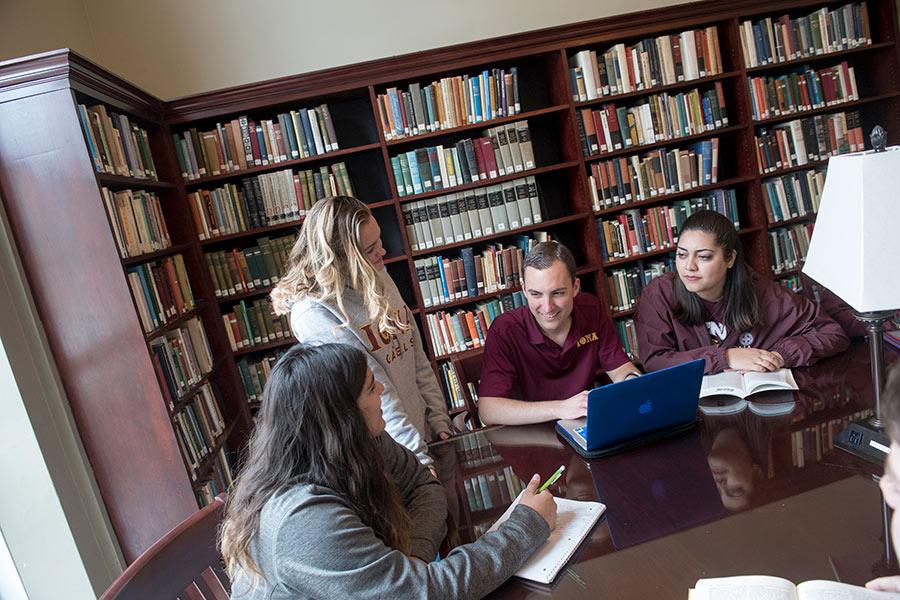English Department
Language shapes our ideas about the world and our place in it. Your passion for language, literature, and the power of the word will be cultivated in our English Department
You will be guided to open your mind to deeper levels of language, literature and composition. You will discover the power of words to change the world.
You will hone your skills to express your insights in reasoned and well-crafted oral and written communication – skills valued by employers.
You will develop your intellectual curiosity through the works of Shakespeare and Chaucer to literature of the modern world.
You will recognize the power of great literature – and how it speaks to you.
English Programs
The Department of English fosters intellectual inquiry into language, literature, composition, and aesthetics. As a dynamic community of teacher-scholars, the English faculty is committed to teaching students to engage in rigorous analysis of a significant body of literature; to learn the uses of language and the rhetorical purpose and structure of texts; to understand the importance of diverse historical and cultural contexts; to appreciate the philosophical and ethical implications of literary portrayals of human behavior; and to take pleasure from the power of the literary arts.
Through courses in writing and literature, students learn the skills necessary to express their insights in reasoned and well-crafted oral and written discourse. They learn to be creative, independent, ethical, and flexible thinkers, and to experience university as a gateway to the joys of lifelong learning.
(Revised, February 2013)
Core Courses in Writing
ENG 120: Communication Skills: Writing I
By the completion of this course, students should be able to:
- write clear, well organized, mechanically correct expository prose
- construct a clear, focused thesis and choose and produce an appropriate organizational structure, for example, comparison/contrast, process analysis, inductive or deductive argument, or persuasion
- approach writing as a process that includes pre writing, drafting, and revising
- demonstrate mastery of the conventions of standard written English, including grammar, syntax, punctuation, and usage
- use the skills of basic research. Students should become familiar with general electronic databases and print reference works such as The Reader's Guide to Periodical Literature and The Humanities Index. They should be able to locate information; summarize, paraphrase, and quote from their sources; acknowledge those sources fully and correctly; synthesize material; and integrate information, as illustration or evidence, into a short research paper that presents their own ideas and arguments on a topic.
Core Courses in Literature
ENG 203: Foundations and Traditions of Literature.
ENG 204: Literature of the Modem World.
By the completion of these courses, students should have been introduced to and have developed a familiarity with a body of traditional and modem literature organized by genre, have explored some major themes and images of the imaginative life, and have demonstrated an ability to:
- use the basic skills of close, critical reading
- understand the figurative uses of language, including imagery, metaphor, and symbolism, and the varieties of voice and tone, such as irony
- appreciate the importance of contexts in interpretation, for example, historical, cultural, philosophical, and ethical perspectives
- consider the importance of the conventions of genre, for example, those of narrative, poetry, drama, and creative non fiction
- recognize some major elements of literary analysis, for example, persona, meter, rhyme, plot, character development, point of view, and theme
- develop those skills in written and oral presentation that they have practiced in core writing and literature courses.
Major Courses
These courses should reinforce and refine those skills developed in core literature and writing courses. Students should engage with greater depth and scope a more specific literature, one that treats individual periods and authors. They should develop their skills of close reading and their awareness of the variety of contexts available for literary interpretation. Building on their learning in earlier courses, they should continue to develop their skills in written and oral presentation. In addition, students in major courses should:
- become familiar, in the gateway course, with the specific databases and reference works particular to the field of literary study, for example, MLA, JSTOR, and scholarly internet sites. In subsequent major courses, this knowledge will be developed and applied to individual authors and periods
- become knowledgeable about the major literary criticism on the authors and periods they are studying
- be able to demonstrate their own critical skills in essays that present their own analysis of texts be able to present a substantial piece of literary research in a clear, well organized, intellectually mature, and stylistically sophisticated essay
- be conversant with the work of two major authors writing in English, Chaucer and Shakespeare, and with selected English, American, Multicultural, and Non Western authors and masterworks
- be familiar with current critical theory and practice and the critical debates current in English studies, the special focus of the Department's Capstone Course.
Graduate Courses
These courses, designed to teach literature to those who are themselves secondary school teachers of English or are preparing for further graduate work, build on the knowledge and skills achieved by an undergraduate English major and are directed to students who have a professional maturity and a capacity for independent reading and research. At the completion of the program, students should have:
- a knowledge of major authors in English, American, Multicultural, and Non Western literature sufficient to provide a foundation for their professional goals
- a developed ability to read complex and challenging literary texts
- a developed ability to write short critical essays and to engage in sophisticated research
- the ability to conduct the independent research and writing that culminate in an MA thesis or other form of advanced research project
- the skills of written and oral presentation at a level of proficiency that prepares them to achieve their professional goals.
Contact Us
English Department
Miles Beckwith, Ph.D.
Department Chair
(914) 637-2725
mbeckwith@iona.edu










